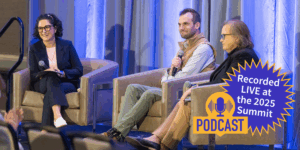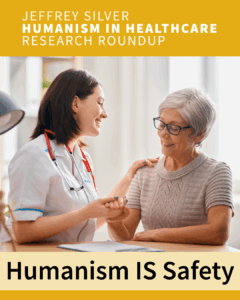
The Jeffrey Silver Humanism in Healthcare Research Roundup features summaries of recently published studies on humanism in healthcare. To receive email notification of new studies once per month, enter your information here and select “Jeffrey Silver Research Roundup” from the checkboxes at the bottom. See previous posts in this series.
Publications from Gold Foundation-Affiliated Authors
Effectiveness of the communication model, C.O.N.N.E.C.T., on patient experience and employee engagement: A prospective study Free full text Barden, A, Giammarinaro, N. Patient Experience Journal. 2018 Nov; 5(3); 160-166.
Northwell Health is a member of the Gold Partners Council.
Northwell Health, a large integrated healthcare organization in New York State, created a humanistic communication model called C.O.N.N.E.C.T. (Contact, Opening, Greeting, Name/Title, Needs, Explanation, Closing, and Thank) to improve individualized personalized care. A prospective study examining its impact on professional education, engagement, and patient experience in three emergency departments was conducted. There were statistically significant results in learned knowledge, applied knowledge of clinicians, and patient experience.
Development of a framework to describe patient and family harm from disrespect and promote improvements in quality and safety: a scoping review Free full text Sokol-Hessner L, Kane GJ, Annas CL, Coletti M, Sarnoff Lee B, Thomas EJ, Bell S, Folcarelli P. Int J Qual Health Care. 2018 Nov 14.
Drs. Lauge Sokol-Hessner, Gregory Kane, Catherine Annas, Margaret Coletti, Barbara Sarnoff, Eric Thomas, Sigall Bell, and Patricia Folcarelli are Mapping the Landscape grantees.
This literature review examined “non-physical” harm a patient may experience within the healthcare system. 23 articles were considered. Areas of concern included care processes, healthcare professional and organizational behaviors, patient and professional factors, the work and care environment, leadership, policies, and culture. The consequences of these negative experiences impacted the patient/family, profession, organization, and society. Based on the literature review, a framework was created to help providers prevent disrespect and harm to the patient within the healthcare setting.
How clinicians integrate humanism in their clinical workplace— ‘Just trying to put myself in their human being shoes’ Free full text Lee Roze des Ordons A, de Groot JM, Rosenal T, Viceer N, Nixon L. Perspect Med Educ. 2018 Oct;7(5):318-324.
Drs. Janet DeGroot, Tom Rosenal and Lara Nixon are Mapping the Landscape grantees.
What attitudes and behaviors lead to humanistic care? Interviews of 10 clinical faculty were analyzed using interpretive description. Five themes emerged: whole-person care (recognizing individuals and their needs as multifaceted), valuing (respect and appreciation of others), perspective-taking (being non-judgmental, listening), recognizing universality (humility, finding common grounds), and relational focus (recognizing patients’ relationships and multiple providers’ roles and influences). These themes provide foundations of attitudes and behaviors of humanistic care and teaching that can be incorporated into patient care, organizational culture, and education.
Measuring medical students’ preparedness and skills to provide cross-cultural care Free full text Green AR, Chun MBJ, Cervantes MC, Nudel JD, Duong JV, Krupat E, Betancourt JR. Health Equity. 2017 Jan 1;1(1):15-22.
Drs. Alexander Green and Edward Krupat are Mapping the Landscape grantees.
Surveys were conducted over four years and assessed Harvard Medical School students’ self-reported levels of cultural competence preparedness and self-assessment. The fourth-year students reported higher scores at statistically significant levels than the first-year students in almost all areas, although notably, fewer than 50% of fourth-year students reported feeling adequately skilled in at least half of the skills areas assessed. Lack of diverse clinical experiences and a need for additional cross-cultural training were cited by a majority of respondents. This article shares one of the few validated tools on cultural competency and highlights both the need for assessment and further consideration of cross-cultural training in medical school.
Tell Me More: Promoting compassionate patient care through conversations with medical students Free full text Qing, D, Narayan, A, Reese, K, Hartman, S, Ahuja, T, Fornari, A. Patient Experience Journal. 2018 Nov; 5(3); 167-176.
Dr. Fornari is a recipient of a Gold Foundation mentoring grant. Northwell Health is a member of the Gold Partners Council.
Can asking three questions of your patients promote humanistic, patient-centered care? Using The Arnold P. Gold Foundation’s Tell Me More® program, medical students at Northwell Health engaged 302 patients in an exercise to build rapport. Responses to these personal questions (“How would your friends describe you?” “What are your strengths?” and “What has been most meaningful to you?”) were documented on a poster kept in the patient’s room. Positive outcomes were identified across medical students, patients, and staff. The program supported a meaningful patient-provider interaction, with staff reporting that this directly improved their ability to provide quality care and patients reporting increased satisfaction.
Other Publications
Making cancer visible: Unmasking patients’ subjective experiences Beach WA. Health Commun. 2018 Nov 15:1-14.
The influential article “The Face of Cancer,” published in 2003, illuminated the ways to establish rapport and foster communication between doctor and a patient with brain cancer. This new article examines the impact of the previous article and draws from almost 200 oncology interviews that were recorded and transcribed to explain similar communication insights. Patients with cancer displayed their concerns and emotions through spoken and nonverbal behaviors. Providers can offer individualized and supportive care by remaining attuned to how patients use their words, faces, and bodies to express emotion and reveal how they are affected by cancer.
Influences on students’ empathy in medical education: an exploratory interview study with medical students in their third and last year Free full text Pohontsch NJ, Stark A, Ehrhardt M, Kötter T, Scherer M. BMC Med Educ. 2018 Oct 5;18(1):231.
What factors promote the development of empathy among medical students? 24 medical students were interviewed using semi-structured interviews and then analyzed. Four themes emerged that influenced the development and expression of empathy: course of studies (role models, hands-on experience), students (insecurities, personal level of empathy, mood, maturity, etc.), patients (state of their health), and surrounding conditions (time pressure, work environment, etc.). Empathy can be developed through hands-on experiences, faculty demonstrating professional behaviors, positive patient encounters, and positive working conditions for the students.
Calling on patient’s perspective in emergency medicine: Analysis of 1 year of patient callback program Free full text Natsui, S, Aaronson, EL, Joseph, TA, Goldsmith, AJ, Sonis, JD, Raja, AS, White, BA, Luciani-Mcgillivray, I, Mort, E. Journal of Patient Experience. 2018 Oct 17; 1-7.
To improve care and to identify areas of improvement, 2,607 patients were called after visiting the emergency department through a callback program. They were asked to identify one area that would have significantly improved their visit. The most commonly cited area was wait time (49.4%), followed by communication (14.6%). Of the communication responses, 69% focused on provider-patient communication. Post-triage, a lack of updates was cited as a problem. Patients also wanted more time with the physician. Nontherapeutic communication styles, rushed providers, rude communication, lack of listening skills, and difficulties in explaining medical and treatment information were also identified as areas of concern.



